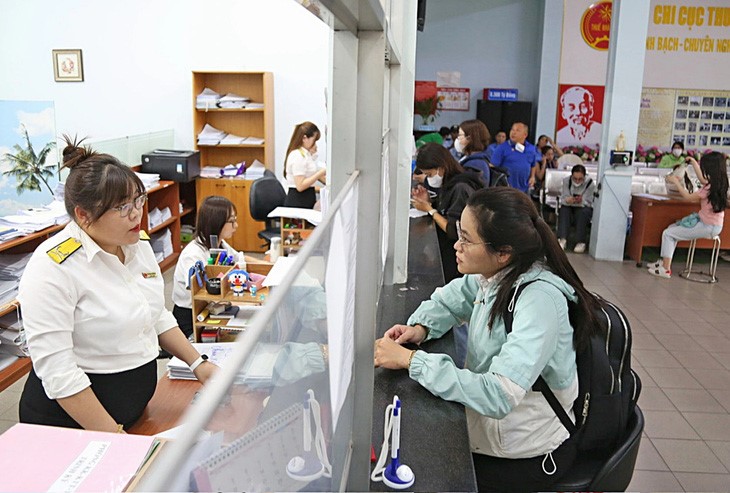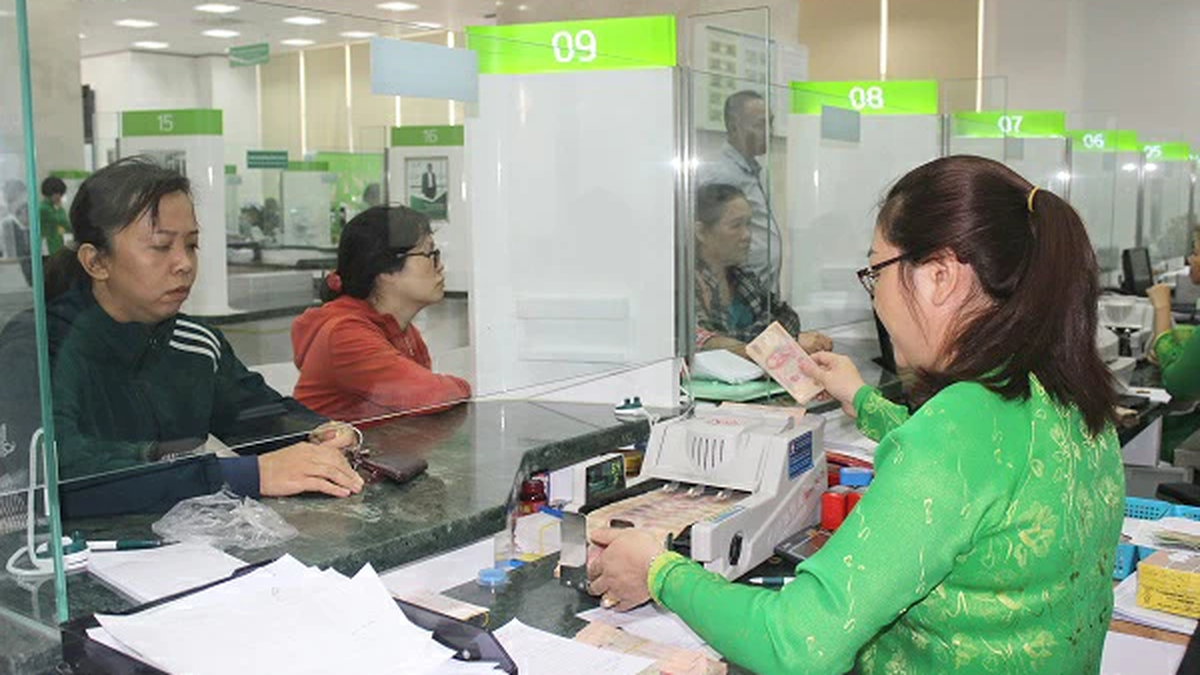Tax authorities will strengthen tax management in the field of e-commerce, from transactions on trading floors to online business forms, livestream...
 |
| Experts note that online business people should register and declare taxes to avoid being charged later - Photo: PHUONG QUYEN |
In the long term, the tax industry will propose regulations requiring e-commerce platforms to pay taxes on behalf of businesses.
That was the affirmation of the leader of the General Department of Taxation when talking to Tuoi Tre on the sidelines of the workshop on tax compliance management in the digital economy organized by the General Department of Taxation on May 13.
Meanwhile, after Tuoi Tre reported on the "Suddenly owing billions in taxes" incident, many people worriedly checked and discovered that they owed hundreds of millions, even billions of dong in taxes due to doing affiliate - activities to attach links to buy goods on e-commerce platforms.
Check tax app, found out I owe billions
"Are you guys okay? Do you still have oxygen to breathe?" are status lines full of thoughts and humor that have appeared in many groups of brothers running aff in recent days.
On an affiliate - MMO forum, a person with the nickname V. said he earned a total of 15 billion VND from running affiliates on the two largest e-commerce platforms today, after the platforms temporarily deducted 10%.
However, after the news that a person with an income of 20 billion VND from an e-commerce platform suddenly discovered that he was owed 5.1 billion VND in taxes caused a stir in public opinion, Mr. V. checked and was shocked to discover that he owed 4 billion VND in taxes.
"The total revenue was 15 billion VND, but after deducting expenses such as advertising, labor, making clips... the profit was only about 2 billion VND. I received this money but split it in half with my co-worker, each of us getting 1 billion VND. After the tax debt was discovered, my co-worker blocked my number and lost contact, leaving me to bear the burden alone," this person confided.
This is not an isolated case. The worst are those who work in groups of 7-8 people, the commission is paid after deducting expenses and is divided equally, now there is a tax debt and they do not know how to handle it.
A person named TV said that the group of 8 people was paid 12 billion VND by the e-commerce platform. After deducting advertising costs, buying pages, groups... each person received 750 million VND.
However, up to now, Mr. TV has been charged by the tax authority for the total revenue that the floor paid, and he does not know how to handle it. While according to statistics, the cost has accounted for 50 - 80% of the total revenue. There are cases where small businesses are also charged 140 million VND.
Not only those who do affiliate work under the name of individuals are subject to tax arrears, many people said that they have established business households even though they do not see tax debts on the eTax Mobile app of the tax industry, but have just been called by the tax authority to request to declare revenue from 2021 to present, and at the same time request to pay taxes and late payment penalties.
Many people complain about losses because they have to bear many costs for premises and teams, while taxes are levied on revenue, which is not the nature of this job, but most opinions encourage businesses to declare and pay taxes, and cannot avoid it.
Not only the revenue from affiliate, online sellers are also encouraged to proactively declare and pay taxes because the tax authorities have now traced the bank accounts. So the longer the delay, the larger the fine.
Ms. P., a business owner on many platforms, complained that "the honeymoon period of running aff, when everyone built channels to do affiliate marketing, is over" because the taxes are too high. "Just doing small-scale business, the tax debt of one platform is up to 40 million VND, if calculated in full, it will probably be up to hundreds of millions", Ms. P. complained.
Will e-commerce platforms pay taxes on behalf of businesses?
Speaking at the workshop on tax compliance management in the digital economy organized by the General Department of Taxation on May 13, Mr. Dang Ngoc Minh, Deputy Director General of the General Department of Taxation, emphasized the strong development of science and technology, especially the explosion of the Internet and digital platforms, which have created a digital economy with great potential. However, this reality also poses many challenges for tax management.
Therefore, speaking with us, a leader of the General Department of Taxation emphasized that this agency will strengthen tax management in the field of e-commerce, from transactions on trading floors to online business forms, livestream...
For businesses with e-commerce activities, tax authorities manage taxes quite strictly. However, for individuals, there are still many taxpayers with very large revenues from business on digital platforms but have not declared and paid taxes.
Therefore, the tax sector has divided the subjects for management. Accordingly, individuals doing business on e-commerce platforms and organizations that own e-commerce platforms are responsible for providing information about sellers to tax authorities via the e-commerce portal. Up to now, 357 e-commerce platforms have been recorded, including many platforms with large market shares such as Shopee, Lazada, Sendo, Voso, Tiki... providing information to tax authorities.
For individuals who have e-commerce business activities but have not registered, declared and paid taxes, the tax authority will invite individuals with large sales to work. With the data system that the tax industry has built, the tax authority will show that individual how much revenue they have, where they are, how much tax they have paid and how much more they have to pay.
"In the near future, the General Department of Taxation will open an automatic electronic information portal similar to the electronic information portal for foreign suppliers - so that individuals and business households can proactively declare and pay taxes. We will also propose amending the law in the direction that e-commerce platforms will pay taxes on behalf of individuals selling on the platform," he said.
As for revenue from Facebook, TikTok, etc., the tax authority will coordinate with relevant authorities to manage taxes. Because it is the responsibility of business people in Vietnam to declare and pay taxes when generating revenue in the Vietnamese market. For foreign e-commerce platforms, there are no regulations requiring the declaration and provision of information of sellers on that platform to taxpayers.
"But if they help businesses evade taxes, the tax industry will coordinate with the Ministry of Information and Communications to have technical measures related to business rights... to control this," he emphasized.
Building a tax database through electronic identification
Discussing tax management of e-commerce activities in Hanoi recently, Mr. Vu Manh Cuong, Director of Hanoi Tax Department, said that from the end of 2023 to now, through electronic identification and authentication, Hanoi tax authorities have built a database of more than 320 enterprises that are owners of e-commerce platforms, 54 enterprises that are e-commerce platforms, about 21,500 enterprises, over 16,500 business households and more than 80,600 individuals with salaries and wages selling on Shopee, Tiki, Lazada platforms, collecting about 110,000 bank accounts, identifying more than 591,200 stores.
Difficult to force e-commerce platforms to pay taxes on behalf of businesses
According to tax expert Nguyen Van Phung, the automatic electronic information portal will be a tool to help people with e-commerce business activities proactively declare and pay taxes conveniently.
"In fact, many individuals sell goods through many channels such as e-commerce platforms, on Facebook, YouTube... Once this electronic portal is available, they will declare and pay taxes directly here," said Mr. Phung.
Meanwhile, many tax experts believe that the regulation requiring e-commerce platforms to pay taxes on behalf of sellers is inappropriate because e-commerce platforms are market management boards and only hold the identities of sellers such as names, citizen identification numbers, tax codes, bank accounts, etc., but do not manage revenue.
"Even knowing the revenue is not enough when many orders are paid in cash. The sales money goes to the seller's account. If the e-commerce platform is forced to declare and pay taxes on behalf of the seller, it is not appropriate," said an expert.
Previously, in mid-2022, when soliciting opinions for this proposal for the decree guiding a number of articles of the Law on Tax Administration, many experts and e-commerce platforms did not support the proposal that e-commerce platforms must pay taxes on behalf of businesses.
For example, the Vietnam E-commerce Association believes that e-commerce platforms only provide technological infrastructure to connect sellers and buyers, and are not income payers, so they are not subject to declaring and deducting income tax from sellers.
Therefore, tax declaration and payment remains the responsibility of the seller.
If tax evasion is detected, criminal liability will be prosecuted.
 |
| People do tax procedures at the tax office - Photo: Q.DINH |
According to the General Department of Taxation, there are 3.1 million business households and individuals nationwide. However, according to the tax authority, there are still many business people who do not register, declare and pay taxes according to regulations.
In addition, there are businesses disguised as business households, business households with large revenues, using many invoices, increasing input costs for businesses.
Therefore, the tax industry said it will strengthen management and limit fraud and tax evasion by individuals and business households, especially businesses that disguise themselves as business households to avoid taxes.
According to Ms. Nguyen Thi Cuc - President of the Vietnam Tax Consulting Association, many individuals who livestream to sell products on the internet have a revenue of billions of dong each year, but the amount of tax that individuals doing online business pay is not much.
Therefore, the tax sector should cooperate with commercial banks, the industry and trade sector... to grasp data and information of taxpayers. At that time, tax management for e-commerce business activities will be more effective, at the same time, restore order and equality in taxes between traditional commercial business and e-commerce business.
"Individuals and business households with e-commerce business activities must also register, declare and pay taxes like traditional businesses. According to regulations, the tax rate for e-commerce business is at an appropriate level, lower than income from wages and salaries.
For example, for online sales revenue for individual businesses, the personal income tax rate is 0.5% and the value added tax is 1%. If tax evasion is detected, in addition to the tax payable, the business person must also pay a late payment penalty, and more seriously, be prosecuted," Ms. Cuc warned.
According to ANH HONG - LE THANH/Tuoi Tre Electronic Newspaper
Source


































































































Comment (0)